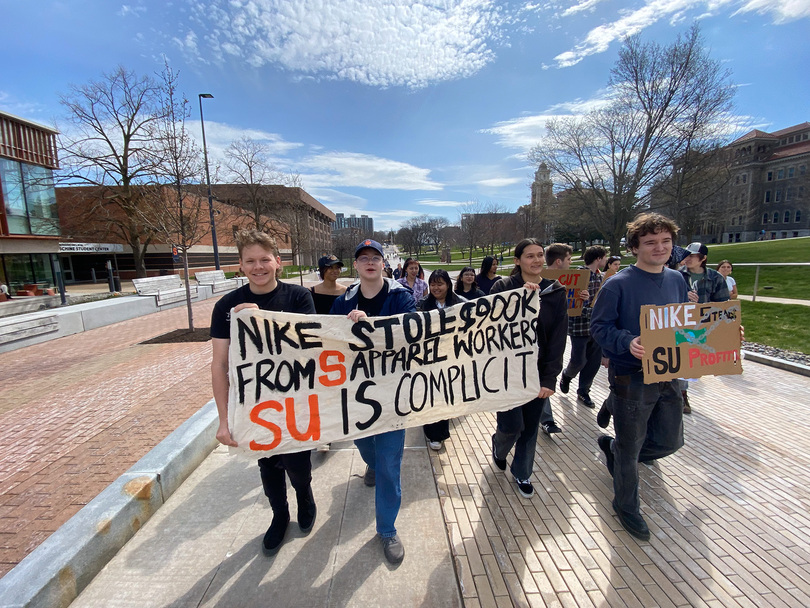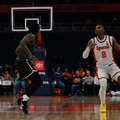Student advocates push for end to SU’s 43-year contract with Nike

SILS at Syracuse University is calling for an end to SU’s 43-year contract with Nike. This follows an investigation that revealed Nike withheld $900,000 in unpaid wages in 2020 from over 3,000 workers. Courtesy of Zeynep Acker
Get the latest Syracuse news delivered right to your inbox.
Subscribe to our newsletter here.
For Nina Tran, founder of Syracuse University’s chapter of Students for International Labor Solidarity, the group’s demands to the university administration are straightforward.
SILS is demanding SU end its 43-year contract with Nike. The agreement supplies the university’s athletes and coaches with Nike apparel and allows SU to profit from any products bearing its logo.
An April 2021 investigation conducted by the Worker Rights Consortium found Nike withheld $900,000 in wages from over 3,000 workers at the Hong Seng Knitting Factory in Bangkok. The report described it as a “scheme to avoid paying workers legally required wages during repeated suspensions of employment” at the subcontracted factory.
In response to the report, Nike released plans in February to implement a remediation plan that will pay the workers $200,000 in paid time off. On Monday, WRC issued a statement expressing its disappointment with the remediation plan, citing several “deficiencies” in Nike’s proposed solution.
Tran said SILS is asking the university to cut ties with Nike to put pressure on the company to compensate its workers. She said SU has yet to take any action about the unpaid wages, despite multiple demands from the organization for the university to do so.
In an email to members of SILS, Rachel Duffy, SU’s director of strategic partnerships and licensing, acknowledged the university has known about the matter since the report was released, and said the university has been “actively engaged” in the situation.
Duffy said SU has already called on Nike to address the issues related to WRC findings. She also highlighted that the Fair Labor Association conducted another comprehensive audit of the Hong Seng Knitting Factory before it published its findings in December 2024.
“While the process has been extensive, the University is optimistic that Nike’s response to the Third-Party Complaint and commitment to a corrective action plan represents significant progress,” Duffy wrote. “Syracuse University is a long-standing member of the Worker Rights Consortium and the Fair Labor Association and will continue to monitor closely Nike’s progress.”
SU declined to provide further comment to The Daily Orange beyond Duffy’s email.
Zeynep Aker, SILS’ incoming president, agreed with WRC’s statement and said the most glaring issue with Nike’s remediation plan is that it would reimburse workers with less than one-fourth of the wages they’re owed. She also criticized the use of paid time off instead of direct compensation.
“During the pandemic, these workers basically had all of their money stolen from them, and Nike is ignoring the problem, or has been ignoring the problem,” Aker said. “As students, we can leverage our power against the university, and put pressure on them, to put pressure on Nike to cut the contract.”

Solange Jain | Photo Editor
Tran said the university is obligated to follow the WRC’s code of conduct, which prohibits labor violations in the use of its global supply chain. She said SU is complicit in the situation for its awareness of the violations and continued inaction.
After watching other SILS chapters take action against Nike, Tran said she was inspired to launch SU’s chapter. She wanted to draw attention to the issue at Syracuse — especially given the school’s long-standing partnership with the brand.
“We go to a university and an institution that really paints itself as justice-serving, diversity-caring, but where is that in its actual action?” Tran said. “Our demand is very easy and very clear. They could do it during their coffee break. It literally takes five minutes to just call up Nike and say, ‘If you don’t pay back your workers, we’re cutting the contract.’”
Since SU has been affiliated with WRC since 2001, Tran said the university is obligated to follow its code of conduct, which prohibits labor violations in the use of its global supply chain. She said SU’s awareness of the violations and continued inaction make the university complicit.
“Our actions have been trying to target not only the administration, but the students, by calling in how they’re complicit in wage theft as well.” Tran said.“By being students here, we give the school so much money, and that money is going to places that we never agreed to.”
Aker expressed frustration with university administrators in their communication with SILS. She said she believes Duffy is the best person to contact Nike, as she serves on the board of directors of FLA and previously served on WRC’s board.
Aker claimed Duffy declined to take further action against Nike and did not meet with SILS representatives in person. SILS members deliver letters to Duffy’s office, but Duffy does not directly collect them, Aker said.
“The communication has been really frustrating. They’re not willing to actually communicate with us,” Aker said. “It’s not like a radical demand. We’re literally just asking for (the workers) to be treated fairly, like the bare minimum.”
She also said the organization’s advocacy has remained peaceful, but alleged SU has gone “out of its way to control” SILS. Tran said she would rather see the university focus its energy on resolving the situation with Nike.
While SILS is demanding SU cut ties with Nike, the organization’s ultimate goal is to get the company to repay its workers, Tran said. She believes SU pressuring Nike would be the most effective way to accomplish that, citing previous efforts by WRC to hold companies accountable for failing to compensate overseas workers.
In 2013, students from several institutions protested their schools’ affiliations with Adidas after the company refused to pay more than $1.8 million in severance pay to 2,800 former factory workers in Indonesia. In response to the student-led campaign, Adidas eventually agreed to settle with the workers and pay the severance.
“All they would need to do is pay back their workers,” Tran said. “In the same year that Nike stole $900,000 from the workers that make our apparel, they made a record-breaking 5.2 billion dollars in profit. That’s like chump change for them.”






